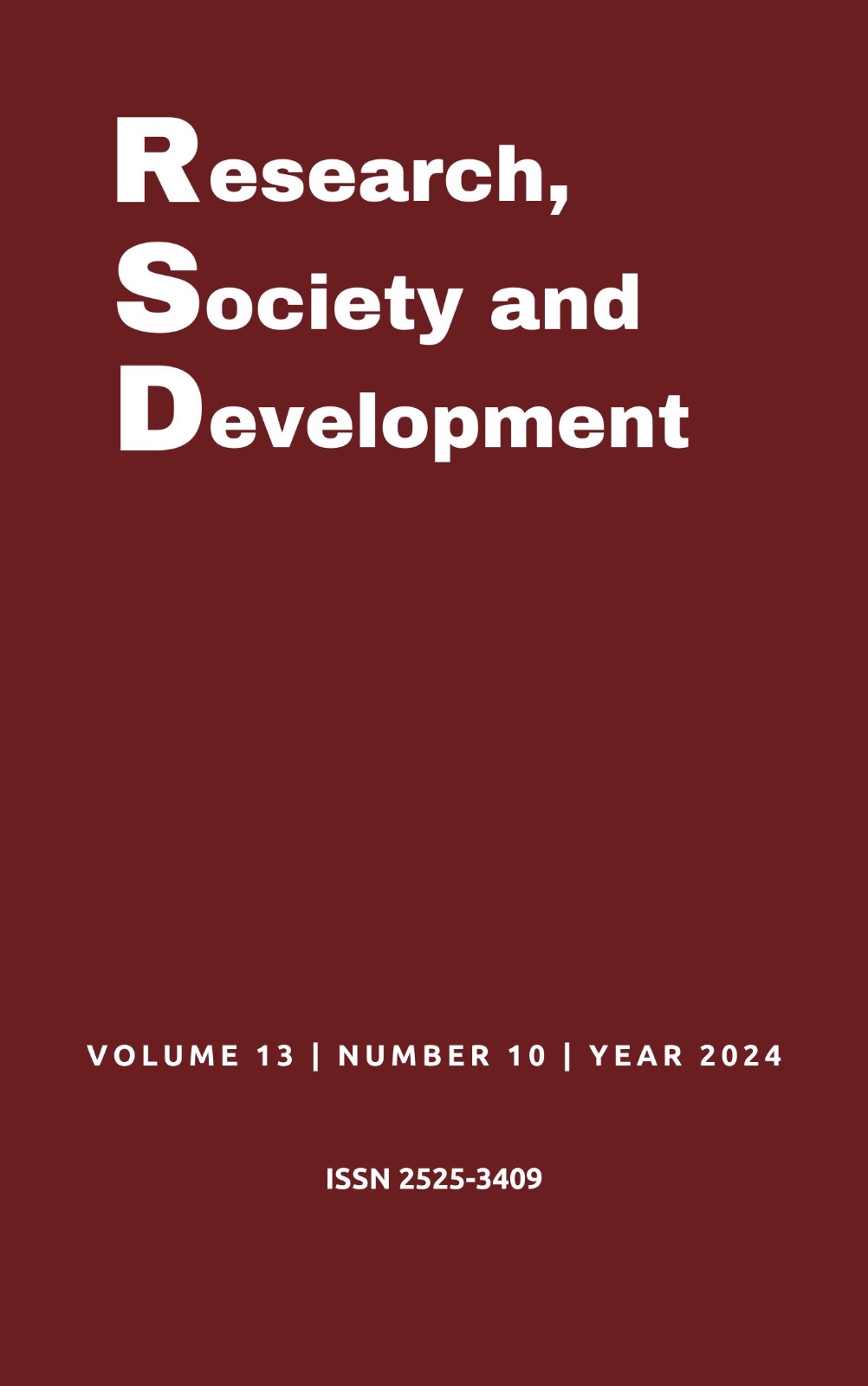Teaching-learning strategies applied in the development of oral production in English as a foreign language
DOI:
https://doi.org/10.33448/rsd-v13i10.45708Keywords:
Teaching-learning Strategies, Oral Production, Oral Skill, Teaching Activities, English Learning, IFL.Abstract
The main objective of this research is to identify the learning strategies that are applied to promote the development of oral production skills in the English language to secondary education students. This study uses mixed methodology that involves combining both approaches, both quantitative and qualitative, it is designed in non-experimental analytical studies. For the sample, the total number of language teachers (4) and 108 students selected through simple random sampling were taken. Two surveys were used to collect data, consisting of ten and 13 questions. The Excel and SSPS programs were used to analyze the data and prepare the frequency tables. It concluded that there is little use of teaching resources and strategies that enhance the learning and development of oral production in students. However, regarding the perception that students have about whether they understand when the teacher speaks to them in English, according to the findings found through the surveys, it is observed that 47.2% almost always understand, which represents relevant data. , and it can be said that teachers are making efforts to meet the objective, so that students learn enough through oral comprehension, but this effort must be accompanied by the ideal strategies to achieve the desired result.
Downloads
References
Artunduaga, M. & Ramírez, S. (2018). Tareas auténticas para promover la producción oral en aprendices de inglés como una lengua extranjera. https://howjournalcolombia.org/index.php/how/article/view/362
Bozorgian, H. (2012). La instrucción metacognitiva mejora la comprensión auditiva. En International Scholarly Research Network ISRN Education. 1-6. https://doi.org/10.5402/2012/734085
Brown, G. & Yule, G. (1983). Teaching the Spoken Language. Cambridge University Press. New York.
Chávez Cabrera, A. (2020). Guarded Vocabulary Strategy en el desarrollo de la expresión oral en el idioma inglés. UCE. Quito.
Figueroa, D., Gonzales, A. & Huamaní, S. (2014). Estrategias meta cognitivas y su relación con las habilidades de comprensión y expresión oral del inglés en los estudiantes del tercer grado de secundaria de la Institución Educativa Javier Heraud, UGEL 01, San Juan de Miraflores, 2014. Universidad Nacional de Educación Enrique Guzmán y Valle. Perú.http://repositorio.une.edu.pe/handle/UNE/1157
Figueroa, E. (2016). Educación, con mención en Educación Superior: Aplicación de la técnica de dramatización para mejorar la expresión oral en el área de inglés en los estudiantes del cuarto grado de educación primaria de la institución educativa Federico Villareal del distrito de Alto Selva Alegre. Tesis de Maestría en Ciencias. . Arequipa, Perú. http://repositorio.unsa.edu.pe/bitstream/handle/UNSA/2425/EDfiluer.pdf?sequence=1&isAllowed
González, A. (2015). Estrategias de enseñanza del idioma inglés utilizando la producción oral. Universidad Tecnológica de Monterrey. Monterrey, México. https://repositorio.tec.mx/bitstream/handle/11285/626572/Alma_Rosa_Gonz%C3%A1lez_Hinojosa_.pdf?sequence=
González, D. (2009). Estrategias de aprendizaje para el desarrollo de la producción oral en la Licenciatura en Lenguas Modernas de la Pontificia Universidad Javeriana. Bogotá, Colombia. https://repository.javeriana.edu.co/bitstream/handle/10554/5855/tesis471.pdf?sequence=1&isAllowed=y
Herazo, J. (2010). Authentic Oral Interaction in the efl Class: What It Means, What It does not. “Interacción oral auténtica en la clase de inglés como lengua extranjera:lo que significa, lo que no”. 12 (1), 47-61. Universidad de Córdoba, Colombia.
http://www.scielo.org.co/scielo.php?script=sci_arttext&pid=S1657-07902010000100004&lng=en&tlng=en
Hernández S., Fernández C., & Baptista, P. (2014). Metodología de la investigación. (6ta. Ed.). McGraw-Hill. México D.F.
Lezama, C. R. Q. (2023). Factores afectivos y la producción oral en estudiantes de inglés como lengua extranjera: Alcances y limitaciones para un aprendizaje eficaz. Fronteras en ciencias de la educación, 2(1), 1-19. https://www.sinergiaacademica.com/index.php/sa/article/view/188
Limay, D. (2018). Gestión curricular en el uso de la estrategia mi pueblo, mi escuela para mejorar la conciencia ambiental de la Institución Educativa Pública N° 1840. Lima: Universidad San Ignacio de Loyola. http://repositorio.usil.edu.pe/bitstream/USIL/5369/3/2018_LIMAY_LOPEZ_DARLI NG.pdf
Ministerio de Educación de la República Dominicana. (2016). Bases de la Revisión y Actualización Curricular. https://www.didactica.edu.do/wp-content/uploads/2018/02/Bases-de-la-Revisi%C3%B3n-y-Actualizaci%C3%B3n-Curricular.pdf
Ministerio de Educación de la República Dominicana (2023). Informe final del nivel Secundario, distrito 18-02, Tamayo. R.D. Oxford, R. L. (1990). Language Learning Strategies: Heinly & Heinly Publisher. Boston.
Pardinas, F. (1998). Metodología y técnicas de investigación en ciencias sociales. México: Siglo Veintiuno Editores.
Prado Paulino, Evelin & Pérez, Dióselin Dilia (2019). Enseñanza y aprendizaje de la producción oral en el 6to. Grado, Segundo Ciclo, Nivel Secundario, Liceo José Francisco Peña Gómez, Distrito Educativo 07-05, año escolar 2018-2019. Universidad Católica Nordestana (UCNE), provincia Duarte, República Dominicana.
Vallejos, V. (2016). El aprendizaje cooperativo y su incidencia en el desarrollo de la producción oral en inglés de los estudiantes de primer y segundo nivel de la Universidad de las Fuerzas Armadas ESPE octubre-noviembre 2015. Proyecto de Investigación previo a la obtención del Grado Académico de Magíster en Lingüística y Didáctica de la Enseñanza de Idiomas Extranjeros. Instituto de Investigación y Posgrado. Facultad de Filosofía. Quito: UCE. 126 p.
http://www.dspace.uce.edu.ec/bitstream/25000/5678/1/T-UCE-0010-1501.pdf
Weinstein, C. E. & Mayer, R. E. (1986). The teaching of learning strategies. En M. C.
Wittrock (Ed.), Handbook of research on teaching. New York: McMillan.
Downloads
Published
Issue
Section
License
Copyright (c) 2024 Lidia Mónica Méndez Santana

This work is licensed under a Creative Commons Attribution 4.0 International License.
Authors who publish with this journal agree to the following terms:
1) Authors retain copyright and grant the journal right of first publication with the work simultaneously licensed under a Creative Commons Attribution License that allows others to share the work with an acknowledgement of the work's authorship and initial publication in this journal.
2) Authors are able to enter into separate, additional contractual arrangements for the non-exclusive distribution of the journal's published version of the work (e.g., post it to an institutional repository or publish it in a book), with an acknowledgement of its initial publication in this journal.
3) Authors are permitted and encouraged to post their work online (e.g., in institutional repositories or on their website) prior to and during the submission process, as it can lead to productive exchanges, as well as earlier and greater citation of published work.


